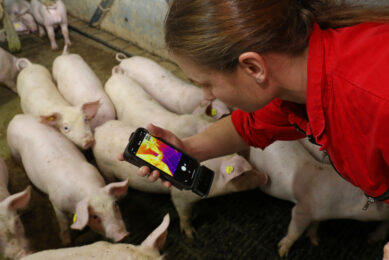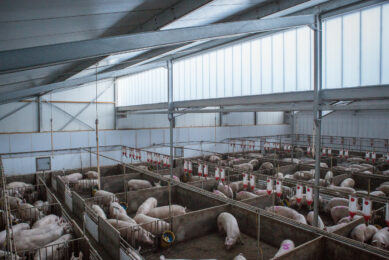FAI report published on welfare management for entire male pigs

The agriculture and science consultancy Food Animal Initiative (FAI) has published ‘Entire Male Pig Production: Welfare Management Issues’, a report focussing on the welfare problems associated with rearing entire male pigs. The report was commissioned by Pfizer.
The report outlines the problems caused by housing entire males in commercial units, including aggression and injury caused by sexual behaviour and considers some of the options for reducing their prevalence.
The report suggests a range of possible solutions to tackling welfare issues caused by entire males in commercial units. These include selection of genetic lines with reduced aggressive tendencies, modification of housing environment to reduce the level of social contact, provision of materials which allow natural rooting behaviour and temporary reduction of testosterone in male pigs.
The report states: “Commercial pig systems can place pigs in challenging social situations and lead to a range of abnormal, or normal but unwanted behaviours. Where normal behaviour is carried out at an increased frequency and becomes problematic, this is often a result of increased social and body contact with other pigs, a lack of environmental enrichment such as materials and high competition for resources such as food and water.”
It points out that while entire male pigs are capable of higher and leaner growth rates compared to females and castrates, when reared under commercial conditions they rarely reach this potential due to increased aggressive, sexual and social behaviour and reduced feeding behaviour.
Injuries acquired through aggression and mounting include skin lesions, bruising and leg problems. Other problems include stress and pregnancies and subsequent slaughter of pregnant gilts.
Aggression is identified as being observed in two specific scenarios. Firstly, mixing unfamiliar pigs can cause a period of intensive fighting until social dominance is established, and secondly there can be longer-term competition over feed and resources.
In general, aggressive behaviours are increased in entire male pigs during and after puberty, and are also increased during the mixing and moving of these animals. Studies have indicated that increased aggression is stimulated by testicular steroid hormones, and that these behaviours stimulate an increase in plasma testosterone, forming a positive feedback level between hormone levels and aggressive and sexual behaviour.
Report author Ruth Clements said: “Rearing entire male pigs can give producers an advantage in terms of a potential growth rate advantage, and obliterates the need for painful castration procedures for the pigs. However rearing entire male pigs can present its own challenges which can leave producers unable to capitalise on any growth rate potential, and leave pigs exposed to other welfare problems resulting from aggressive and sexual behaviours.”
Related website:
Pfizer Animal Health
FAI











